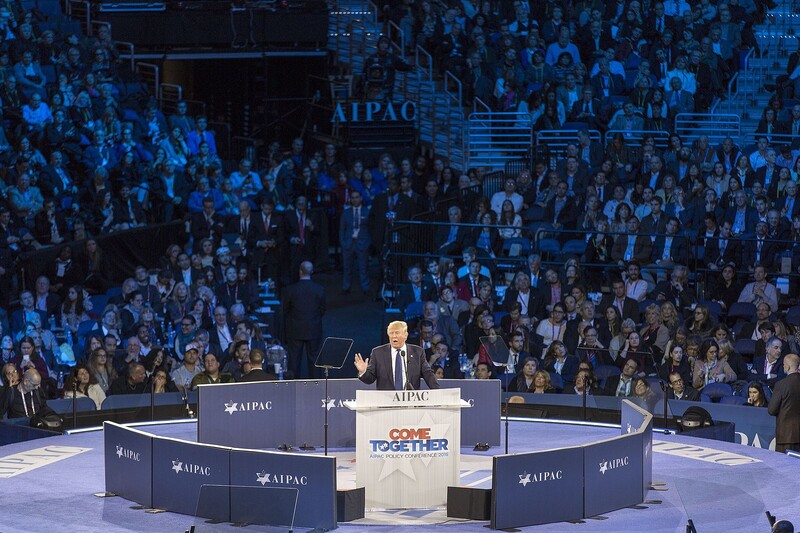Activism and BDS Beat 9 November 2016

Donald Trump speaks at the conference of the Israel lobby group AIPAC in Washington, DC, on 16 March. (Lorie Shaull/Wikimedia Commons)
The US State Department this week joined the European Union, Sweden, Ireland and the Netherlands in recognizing the right to boycott Israel.
But whether this position will survive under the incoming administration of President-elect Donald Trump is an open question, given his history of erratic statements on the Middle East.
State Department spokesperson Mark Toner was asked on Monday if the US has a view on a bill introduced in the Knesset, Israel’s parliament, that would bar supporters of BDS – boycott, divestment and sanctions – from entering the country.
“Our strong opposition to boycotts and to sanctions of the state of Israel is unchanged and well known,” Toner said.
But then he added, “We value freedom of expression, even in cases where we do not agree with the political views espoused.”
This stance aligns with the formulations of the EU’s top foreign policy official and two of the bloc’s member governments – the Netherlands and Ireland.
By noting that “we don’t believe that individuals or groups that want only to express their political views should be prohibited from doing so,” Toner signaled the US government’s objection to the Israeli legislation.
When asked if he agreed that BDS “is actually a nonviolent, peaceful effort” in support of Palestinian rights, Toner was succinct in his response: “Yes.”
Constitutional right
“The US is essentially saying that despite its unconditional support for Israel it cannot condone Israel’s desperate attempts to criminalize or prosecute support for the fast growing Palestinian-led BDS movement for Palestinian rights,” Garik Ruiz, North America liaison for the Palestinian Boycott, Divestment and Sanctions National Committee (BNC), told The Electronic Intifada.
“The administration is reiterating the long-standing position that boycotts are protected speech under the US Constitution, even if Israel is the target of these boycotts,” Ruiz added.
“Coming on the heels of the EU’s recent announcement that European citizens have a right to boycott Israel to support Palestinian rights … this official US position will further boost the BDS movement’s promising fight for the right to boycott Israel,” Ruiz said.
“Boycott, divestment and sanctions are tools for peaceful resistance to state violence, discrimination and injustice,” Naomi Dann, media program manager for Jewish Voice for Peace, told The Electronic Intifada. “More than ever right now it is crucial that our local and federal governments uphold these political rights.”
BDS and Donald Trump
Defeated Democratic candidate Hillary Clinton had said she would make fighting BDS a key goal if she were president.
“I know you agree that we need to make countering BDS a priority,” she wrote in a July 2015 letter to Haim Saban, the billionaire donor and anti-Palestinian activist who poured millions of dollars into her failed presidential bid.
Trump is not known to have said anything about BDS himself, but the Republican Party platform takes a strong position against the nonviolent movement.
“We condemn the campus-based BDS campaign against Israel,” the platform states. “It is anti-Semitism and should be denounced by advocates of academic freedom.”
The party platform equates the BDS campaign with “terror” and “reject[s] the false notion that Israel is an occupier.” It adds that BDS “seeks to destroy Israel.”
The Palestinian call for BDS demands an end to Israeli occupation, equal rights for Palestinian citizens of Israel and the full rights of Palestinian refugees.
The Republican platform also endorses Israel’s “right and obligation to defend itself … against alternative forms of warfare being waged upon it legally, economically, culturally and otherwise.”
This suggests possible Republican support for violent Israeli reprisals against activists pursuing nonviolent avenues to secure Palestinian freedom.
Threats
In April, Amnesty International felt it necessary to voice concern for the “safety and liberty of Palestinian human rights defender Omar Barghouti and other boycott, divestment and sanctions (BDS) activists, following calls alluding to threats, including of physical harm and deprivation of basic rights, made by Israeli ministers.”
These threats, which are strikingly similar to the language in the Republican platform, were made at the “Stop the Boycott” conference in Jerusalem last March that was attended by EU and US diplomats.
The Republican Party’s determination to pursue legislation against the BDS movement – in which they are joined by many Democrats – is likewise no idle threat.
Palestine Legal notes that as of this month, 13 states have enacted anti-BDS legislation, while New York Governor Andrew Cuomo signed an executive order instructing state agencies to divest from companies and institutions that adhere to BDS.
As dismal as President Barack Obama’s track record is regarding Palestinian freedom, Trump is now poised to be no less a stubborn obstacle to the fulfillment of Palestinian rights than the man he will replace in the Oval Office.
His resort to demagoguery and open racism during this campaign raises fears he could be even worse.





Comments
You jest
Permalink John Costello replied on
"Even worse", no! Not really, jeez ya think?